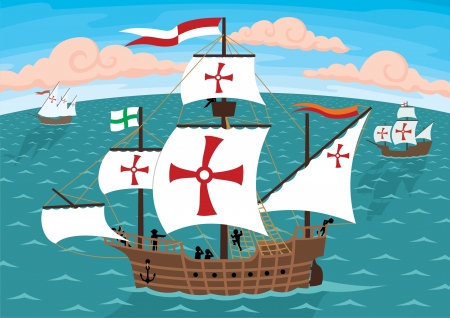Columbus Day: Holiday or Tragedy?

October 25, 2017
Columbus sailed the ocean blue in 1492. For years, that is all most Americans have cared to know about the man who is said to have discovered America, even though he never set foot in North America. He also wasn’t even the person who first saw the land. Then there’s the little detail that he was, by many accounts, a murderer and a rapist.
Since schools often neglect to teach children the darker side of history, young people are often misled to think that Columbus was a pure-hearted man who discovered America and made everything better. Though it is undeniable that he changed things, there is much more to the story. Freshman Joey Chambers stated, “Kids not learning who [Christopher Columbus] really was is terrible for our society.”
What really happened in 1492? According to virtually all accounts, Christopher Columbus set sail on a trip to Asia, and he got lost. Nowhere near Asia, he stumbled upon an island in the Caribbean when one of his crew members saw a shore in the distance, which he assumed was Asia. Columbus then took credit for the finding and planted his flag in the soil, naming the island San Salvador.
According to “A Peoples History of the United States” by historian Howard Zinn, when Columbus first saw the natives, he wrote in his journal, “They … brought us parrots and balls of cotton and spears and many other things, which they exchanged for the glass beads and hawks’ bells. They willingly traded everything they owned. … They were well-built, with good bodies and handsome features. … They do not bear arms, and do not know them, for I showed them a sword, they took it by the edge and cut themselves out of ignorance. They have no iron. Their spears are made of cane. … They would make fine servants. … With fifty men we could subjugate them all and make them do whatever we want.”
From there Columbus wreaked havoc on the native people and their land. According to written accounts in Zinn’s book, Columbus and his men forced the people to work in the island’s gold mines. If they did not produce a certain amount of gold, they had their hands chopped off and they bled to death. Columbus and his men often made sport of their murders, going on random rampages through the streets. There are accounts of Spaniards testing the sharpness of their weapons on the natives by cutting them in half.
He also forced sex slaves on the island women. Zinn includes an account from Columbus’ own writing describing his sexual advances toward an “Indian” woman. He wrote, “I conceived desire to take pleasure. I wanted to put my desire into execution but she did not want it and treated me with her fingernails in such a manner that I wished I had never begun. But seeing that (to tell you the end of it all), I took a rope and thrashed her well.”
There were only a couple hundred natives left on the island after Columbus left. Although historians disagree, there may have been up to 250,000 people living there originally. They perished in great numbers from murder, exhaustion and overwork. Some natives committed mass suicide, some killed their children, and some intentionally poisoned themselves to avoid abuse, slavery and violent death.
Bartolome De Las Casas, a former slave owner who became Bishop of Chiapas, described his observations: “Such inhumanities and barbarisms were committed in my sight as no age can parallel. My eyes have seen these acts so foreign to human nature that now I tremble as I write.”
SFHS history teacher Annamarie Craig said of Columbus Day, “It is a very controversial holiday.” When Ms. Craig teaches about Columbus in her class, students create a list of pros and cons. When asked whether she thought Columbus had more pros or cons she said, “If it were me, if I met him, would I like him? No. But can I cast aside his contributions? No. Really, you can see both sides.”
History teacher Mr. Castillo said, “We have to honor a person for their good qualities. Columbus did bring Christianity to the New World, and that is a good influence. … Sometimes we think we have to be so politically correct that we forget to consider the other side.”
Does Mr. Castillo have a point? Regardless of the type of person Columbus was, he did greatly influence our lives today. Though he ever actually colonized the New World, he showed that colonization was possible. He opened the door for exploration, and that changed the whole world. According to the History Channel website, he established Christianity in the Caribbean, as well as a more industrially advanced culture. He also brought livestock to the New World and brought tropical fruits back to Spain.
There are many perspectives on this sensitive issue, but according to a recent survey by
Marist College, 57 percent of Americans say it’s a good idea to have a holiday named after Columbus while 29 percent oppose it, and the remaining 14 percent have no opinion.
So how do we celebrate at Santa Fe High? According to the SFPS calendar, October 9 was “Fall Break,” and a memo sent out to staff suggested ways to celebrate “Indigenous People’s Day.”

